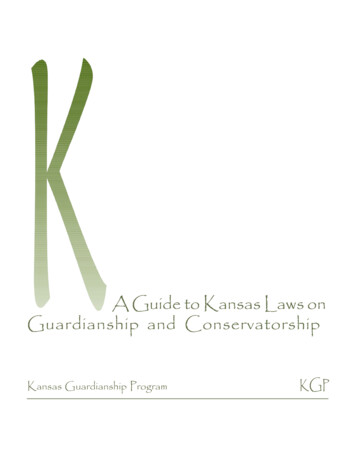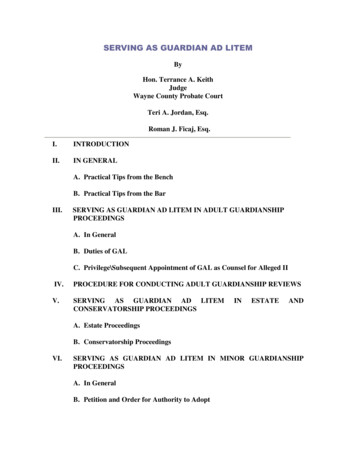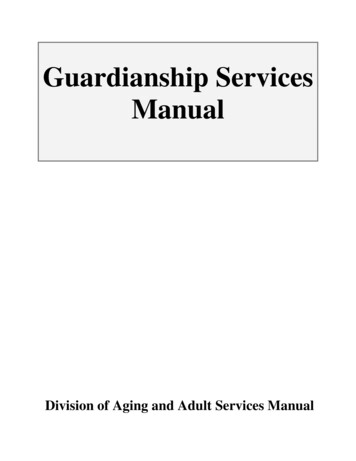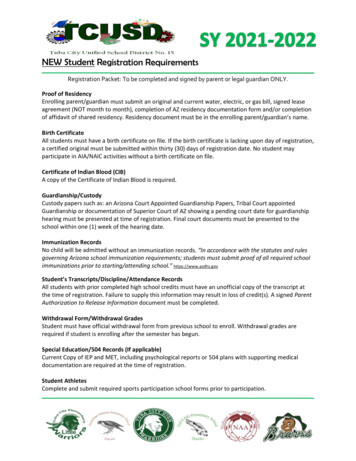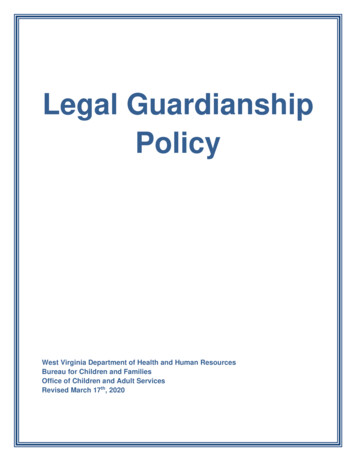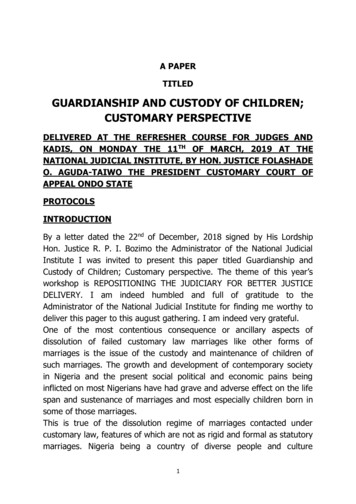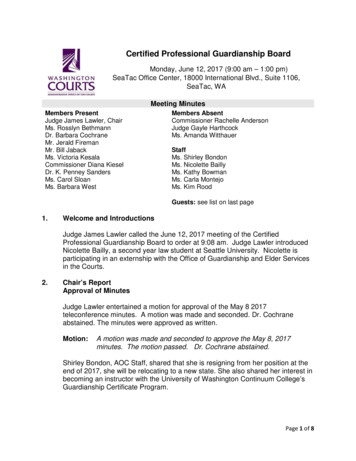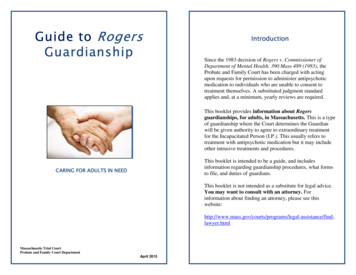
Transcription
Guide to RogersGuardianshipIntroductionSince the 1983 decision of Rogers v. Commissioner ofDepartment of Mental Health, 390 Mass 489 (1983), theProbate and Family Court has been charged with actingupon requests for permission to administer antipsychoticmedication to individuals who are unable to consent totreatment themselves. A substituted judgment standardapplies and, at a minimum, yearly reviews are required.This booklet provides information about Rogersguardianships, for adults, in Massachusetts. This is a typeof guardianship where the Court determines the Guardianwill be given authority to agree to extraordinary treatmentfor the Incapacitated Person (I.P.). This usually refers totreatment with antipsychotic medication but it may includeother intrusive treatments and procedures.This booklet is intended to be a guide, and includesinformation regarding guardianship procedures, what formsto file, and duties of guardians.CARING FOR ADULTS IN NEEDThis booklet is not intended as a substitute for legal advice.You may want to consult with an attorney. Forinformation about finding an attorney, please see gal-assistance/findlawyer.htmlMassachusetts Trial CourtProbate and Family Court DepartmentApril 2015
What is a Rogers Guardianship?Guardianship?A guardian for an adult is a person appointed by a judge inthe Probate and Family Court who is given responsibility tomake decisions for an individual after a judge has decideds/he is not competent to make their own informed decisions.Some guardians can make decisions about treatment of aperson with mental illness that is considered “extraordinary”medical treatment. These are called Rogers guardianships.Table of ContentsWhat is a Rogers Guardianship? .2Who is the Petitioner? .3At a Rogers guardianship hearing, the Court is asked toauthorize extraordinary medical treatment for anIncapacitated Person. This usually refers to treatment withantipsychotic medication, but it may include other intrusivetreatments and procedures such as sterilization orelectroconvulsive therapy.Who is the Respondent? .3What is the Legal Definition of an Incapacitated Person? .4What are the rights of the Respondent ? .4Becoming a Rogers Guardian: Procedure for Guardianship ofAdult . 5-10If a person who has been determined to be incapacitated isprescribed antipsychotic medications, the IncapacitatedPerson will need a guardian who has been granted Rogersauthority by the Court.Administrative Process for Uncontested Annual RogersReviews .11Before Rogers authority is granted, the Court must find thatthe person:Nursing Home Admission .121. Is incapacitated and not competent to give informedconsent with respect to being treated withantipsychotic medications and,2. If incompetent, determine what the person wouldchoose to do if he or she were competent, withregard to taking antipsychotic medication(s).What is a Rogers Monitor? .5This is called a “substituted judgment” standard wherein theCourt substitutes itself for the Incapacitated Person andattempts to determine what the person would decide for him12
or herself if she or he were competent. The Court mustconsider the following when determining substitutedjudgment: What is the Legal Definition of anIncapacitated Person (I.P.)?(I.P.)?An Incapacitated Person (I.P.) is someone who isdetermined by the Court to have a clinically diagnosedcondition that leaves themunable to make orcommunicate decisionsaffecting their physicalhealth, safety, or self-care.preferences the person may have expressedpreviously regarding treatment with antipsychoticmedications;the person’s religious convictions;the impact of the decision on the person’s family;the probability of adverse side effects; and,possible outcomes (prognosis) with and withouttreatmentA person is not“incapacitated” just because they are elderly.Rogers guardianship cases are reviewed every year by theCourt.The Guardian appointed by the court for an I.P. will makesome or all decisions for the I.P.Who is the Petitioner?The person who files a petition in court is called thePetitioner.If the I.P. requires medical treatments or care that the courtconsiders “extraordinary”, a guardian must obtain theCourt’s permission before authorizing the treatment.The Petitioner may be a physician, a hospital, a facility, astate agency, a friend, a neighbor or a family member.What are the Rights of the Respondent?espondent?1.) The right to an attorney. When the Petition is filed,if the Respondent cannot afford a lawyer, the Courtwill appoint an attorney to represent her or him. Theattorney will tell the Court what the person wants,not necessarily what is in his or her best interests.2.) The right to notice that a petition for guardianshiphas been filed and the date, time, and place of thecourt hearing.3.) The right to be present at the hearing unless thereare significant reasons for not attending.The Petitioner informs the Court about the person’scondition and needs which is validated by the filing of aMedical Certificate (MPC 400) or Clinical Team Report(MPC 402).Who is the Respondent?The person the Petitioner thinks needs assistance is calledthe Respondent. With respect to a Rogers Guardianship theRespondent is an Incapacitated Person.34
4.) The right to object to the appointment of aguardian and the right to present evidence and crossexamine witnesses.5.) The right to object as to who will be namedguardian or monitor.Procedure for filing a Petition to beappointed Guardian of an AdultThe procedure is described in detail on the Probate andFamily Court website hat is a Rogers Monitor?The necessary forms are also available on our ans/guardian-ipforms.htmlWhen the Court grants the guardian Rogers authority, theCourt also appoints a person who is called a Rogers Monitorto oversee that the I.P. is being medicated in accordancewith the Court approved treatment plan.If you need assistance, you may contact the Registry ofProbate for the Probate and Family Court in your county.In addition, assistance for qualified individuals may beavailable at these courthouses:The Rogers Monitor may be the person who was appointedas guardian or, it may be a different person.The Rogers Monitor should immediately review the detailsof the Appointment of Rogers Monitor (CJP 115) formwhich describes the duties of the Monitor.The Rogers Monitor and the guardian will review medicalrecords, meet with staff and may attend case conferences ifthe I.P. is in a hospital or other facility.The Rogers Monitor must report to the Court in writing on aregular basis. A report must be filed prior to the yearlyreview. Failure to file reports may result in removal of theMonitor.Suffolk Division-Court Service CenterEdward W. Brooke Courthouse24 New Chardon StreetBoston, MA 02114Norfolk Division-Wednesdays from 10 a.m. until 2 p.m.Norfolk Probate and Family Court35 Shawmut Road – 1st flr.Canton, MA 02021Middlesex Division- Thursdays from 9 a.m. until 1p.m.Middlesex Probate and Family Court208 Cambridge Street – 2nd flr.East Cambridge, MA 02141Becoming a Rogers GuardianTo become a Rogers Guardian, a petitioner files a Petitionfor Appointment of Guardian for an IncapacitatedPerson (MPC 120) and specifically requests the authority toadminister antipsychotic medication or other“extraordinary” medical treatment.Franklin Division-56Court Service CenterFranklin Probate and Family Court43 Hope St.Greenfield, MA 01302
In other divisions of the Probate and Family Court, pleasesee the Lawyer of the Day or the Court Service Center forassistance.Service: Citation and NoticeThe Court will issue a citation with a “return date”. Anyonewho objects must do so by filing an appearance form by thereturn date. The citation must be delivered to theRespondent in person (“in hand”) by a disinterested person(someone who has no involvement in the case). Otherinterested parties will receive the notice by mail or inperson. If an interested party is of parts unknown, the Courtwill order the Petitioner to publish the citation in theRespondent’s local newspaper. If warranted, a fee waivermay be granted by the Court to cover the cost of publication.Where do I file a Guardianship Petition?A Guardianship Petition must befiled in the county where theRespondent resides OR where awill nominating a guardian couldbe probated OR in the countywhere an incapacitated person isadmitted to a facility pursuant to a Court order.Additional Forms You Need To FileTo request court approval to treat the Respondent withantipsychotic medication, you must check the box at ##14,“to treat Respondent with antipsychotic medication inaccordance with a Treatment Plan” OR “for the followingtreatment or action”.What is the Fee?There are no filing fees for Guardianship petitions.All forms can be found on our website rmsgeneric.htmlBond of GuardianAs the proposed guardian, the Petitioner must prepare andfile a Bond (MPC 801) for both temporary and permanentguardianship. The Bond promises that the petitioner agreesto submit to the jurisdiction of the Court. Since thisappointment does not authorize the guardian to control theassets of the respondent, the guardian’s bond mayy be filedwithout sureties.Medical Certificate (MPC 400) for an incapacitated personwho is mentally ill.Exam of Respondent must take place within 30 days of eachhearing date.The Medical Certificate must be signed by a registeredphysician, a licensed psychologist or a certified psychiatricnurse clinical specialist.The Bond requires the estimated value of the real estate andthe personal estate belonging to the Respondent.78
Clinical Team Report (MPC 402) for an incapacitatedperson who is developmentally delayedWhat Happens Next?If the judge decides the Respondent is competent to makehis or her own decisions, the guardianship petition will bedismissed.Exam of Respondent must have taken place within 180 daysof the day the petition is filed.If the Court finds that the guardianship should be allowed,and that the Rogers Treatment Plan should be approved, theCourt will issue a decree, findings, and approve a treatmentplan.The Clinical Team Report must be signed by a physician, alicensed psychologist and a social worker.Clinician’s Affidavit as to Competency and Treatment(MPC 800)Clinician’s Affidavit must be completed by a licensedphysician, psychiatrist, or certified psychiatric nurse clinicalspecialist who treats the Respondent or who has evaluatedthe Respondent.The Court will appoint a Guardian (who may be thePetitioner(s) or a different person), and a Rogers Monitor.NOTE: The Guardian and the Rogers Monitor may be thesame person, or two different people.An initial Guardian Report/Care Plan (MPC 821) mustbe filed 60 days after the appointment of a permanentguardian.Temporary GuardianshipWhile a Petition for Guardianship is pending, if anemergency exists, the court may appoint a temporaryguardian for a specific purpose, for a specific length of time(usually 90 days).Finally, the Court will set a review date for one year afterthe permanent decree. At the yearly review, the Court willconsider reports submitted and eitherThe Hearing At the time of the hearing, Petitioner needs to submitproposed Findings of Fact and a proposed Treatment Plan(MPC 825). The Treatment Plan includes the antipsychoticmedication(s) being proposed (with dosage and dosagerange) and lists any alternative medications that might beimplemented within the next 12 months. The Court will require a CARI (criminal record check) ofthe proposed guardian.910Continue the treatment plan for another year if nochanges ORApprove a new (different) treatment plan ORIf a doctor has determined that the incapacitatedperson does not need to continue taking antipsychoticmedications, and has regained the ability to make hisor her own decisions, dismiss the guardianship.
Administrative Process for Uncontested*SEE Standing Order 4-11 of the Probate and Family CourtAnnual Rogers Reviews fcourt/probate/pfc-orders/4-11.htmlThere is an Administrative Process for annual Rogersreviews and/or extensions if there are no disagreementsbetween those involved in the care of the I.P. This process isavailable beginning one year after entry of the permanentdecree of guardianship.Nursing Home AdmissionAfter a Decree and Order of Appointment of a Guardian ofan Adult has issued, if the Guardian seeks to admit theIncapacitated Person to a nursing facility for sixty (60) daysor less, s/he must file a Notice of Intent to Admit to aNursing Facility for Short Term Service (MPC 839).If there is NO disagreement, the following paperwork shallbe filed with the Court in order to have the matter handledadministratively without the necessity of having a hearingbefore a judge:If a nursing home stay of more than sixty (60) days isanticipated or becomes necessary, a Petition to Expand,Modify or Limit the Powers of a Guardian and/orConservator (MPC 220) will need to be filed. Motion to Extend and/or Amend Treatment Plan(MPC 826) Motion to Waive Appearance of Respondent(MPC 391)Additional Information Clinician’s Affidavit and Report for Extension/Amendment (MPC 823)The Guardian, the Respondent, or any other interested partymay request a court hearing whenever circumstances requireit. Treatment Plan (MPC 825) Report of Monitor (MPC 404) Guardian’s Care Plan/ Report (MPC 821)All forms can be found on our website at: Representations of Respondent’s Counsel(MPC ormsgeneric.html Review Order (MPC 827)A permanent guardianship ends (terminates) in one of twoways: the Guardian or the Incapacitated Person dies OR it isdetermined that the I.P. is no longer incapacitated.1112
www.mass.gov/courts13
of the Appointment of Rogers Monitor (CJP 115) form which describes the duties of the Monitor. The Rogers Monitor and the guardian will review medical records, meet with staff and may attend case conferences if the I.P. is in a hospital or other facility. The Rogers Monitor must report to the Court in writing on a regular basis.
